hartlepool
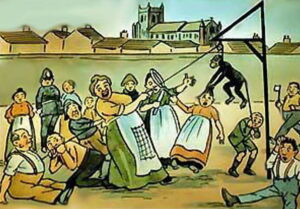 A story is told in Hartlepool, England about an incident during the Napoleonic Wars, of an incident involving a monkey, who came into the custody of the British Army when the ship he was on was wrecked in a storm of the coast of Hartlepool. The sole survivor from the sip was said to be a monkey, who the captain owned, and dressed in the uniform of the ship. That being French, his little uniform was that of the French Army as a form of amusement for the crew. The monkey managed to make it to the shore and was found by a group of locals who apparently also were amused. They decided to hold an impromptu trial, because the monkey was, after all the enemy. Because the monkey was unable to answer their questions, and because they had seen neither a monkey nor a Frenchman before, they concluded that the monkey must be a French spy. With that, they found the monkey guilty and sentenced him to death by hanging, right there on the beach.
A story is told in Hartlepool, England about an incident during the Napoleonic Wars, of an incident involving a monkey, who came into the custody of the British Army when the ship he was on was wrecked in a storm of the coast of Hartlepool. The sole survivor from the sip was said to be a monkey, who the captain owned, and dressed in the uniform of the ship. That being French, his little uniform was that of the French Army as a form of amusement for the crew. The monkey managed to make it to the shore and was found by a group of locals who apparently also were amused. They decided to hold an impromptu trial, because the monkey was, after all the enemy. Because the monkey was unable to answer their questions, and because they had seen neither a monkey nor a Frenchman before, they concluded that the monkey must be a French spy. With that, they found the monkey guilty and sentenced him to death by hanging, right there on the beach.
Apparently, any enemy soldier was to be dealt with in this manner and a trial wasn’t even really necessary. As the story goes, they proceeded with the “hanging” and found it a seriously difficult task, because the monkey kept climbing up the rope to safety. The whole situation, and the local townspeople because the laughingstock of the area, due to their inability to carry out a simple hanging. Everyone in the area got such a kick out of the whole situation, that they made up a song, and even changed the mascot of the local rugby teams to one or the other version of “The Monkey Hangers.” In fact, it was the decision of the local football club, Hartlepool United FC, who capitalized on their “Monkey Hangers” nickname by creating a mascot called “H’Angus the Monkey” in 1999. Two of the town’s six rugby union clubs also use variations of the hanging monkey. Hartlepool Rovers crest being a beret wearing monkey hanging from a gibbet, while Hartlepool RFC neckties sport a rugby ball kicking monkey suspended from a rope. 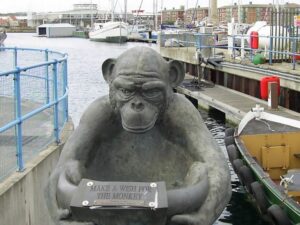
A statue of the monkey has been erected on the Headland and another at Hartlepool Marina (formerly in West Hartlepool). The statues serve to collect coins for a local hospice. Although some Hartlepool residents find the term “monkey hanger” insulting, a large number of residents have embraced the term and celebrate it as an important and unique characteristic of the town. Those offended thought it made them look stupid and incapable of sensible thought. I can understand both trains of thought, because no one wants to look stupid. Still, maybe they should have just embraced it as the joke it was. It doesn’t look like it is going away anyway.

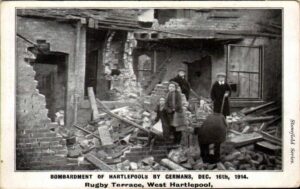 Any army is going to try attack the enemy in a sneaky way, so that their enemy is not ready…and indeed, has no idea the enemy is even nearby. When it comes to sneak attacks, we often think about the Japanese and Pearl Harbor, but they were not the only ones to do it. The Germans were just as likely to sneak up on their targets as the Japanese.
Any army is going to try attack the enemy in a sneaky way, so that their enemy is not ready…and indeed, has no idea the enemy is even nearby. When it comes to sneak attacks, we often think about the Japanese and Pearl Harbor, but they were not the only ones to do it. The Germans were just as likely to sneak up on their targets as the Japanese.
At approximately 8am on December 16, 1914, Franz von Hipper sent German battle cruisers from his Scouting Squadron to attack the British navy. The attack caught the British completely by surprise, as the Germans began heavy bombardment of Hartlepool and Scarborough…two English port cities on the North 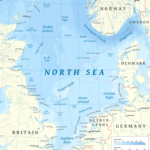 Sea. In the attack that lasted an hour and a half, the Germans killed more than 130 civilians and wounded another 500. The attack brought a swift and vicious response from the British press, who called the incident another example of German brutality. The German navy countered that the two port cities were valid targets due to their fortified status. It didn’t justify the attack, but it was the excuse the Germans used.
Sea. In the attack that lasted an hour and a half, the Germans killed more than 130 civilians and wounded another 500. The attack brought a swift and vicious response from the British press, who called the incident another example of German brutality. The German navy countered that the two port cities were valid targets due to their fortified status. It didn’t justify the attack, but it was the excuse the Germans used.
The attack was quickly answered by the British. Two defense batteries in Hartlepool were dispatched to attack the German vessels, damaging three of them, including the heavy cruiser, Blucher. Hipper’s plan was to draw the British forces to pursue them across waters freshly laced with mines. They also had another German fleet, commanded by Admiral Friedrich von Ingenohl, waiting offshore to provide support. The plan fell through when the hoped-for major confrontation did not take place. Instead, the British decided to keep most of their fleet, which had been depleted by the dispatch of their major cruisers to pursue the dangerous squadron of Admiral Maximilian von Spee, in the harbor.
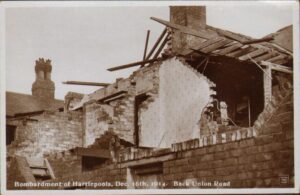

The Scouting Squadron attempted a repeat attack one month later using the same tactics used to surprise the British at Scarborough and Hartlepool. That attempt resulted in the Battle of Dogger Bank, where Hipper’s squadron was defeated, but unfortunately managed to avoid capture. The biggest drawback of a sneak attack is that it can really only be used once. After that the enemy is prepared and watching.

